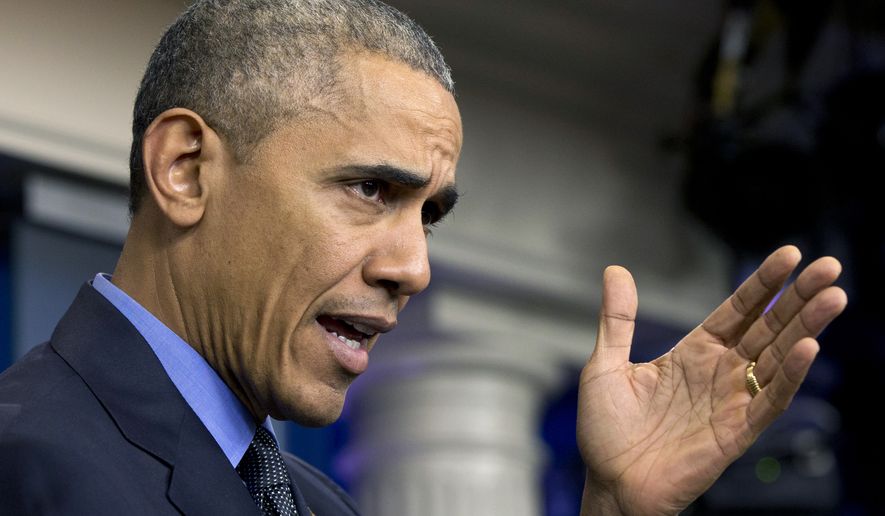Leaders in Congress and the U.S. attorney general say President Obama simply doesn’t have legal authority to close the Guantanamo Bay detention facility through executive action, but that fact didn’t stop a supremely confident president last week from threatening to act on his own if lawmakers won’t cooperate.
At a year-end press conference on Friday — the same day Mr. Obama signed a massive spending bill that seems to prohibit him from closing Guantanamo on his own — the president said he will explore the limits of his executive power if the House and Senate don’t pass legislation to shutter the prison.
The statement underscores Mr. Obama’s belief that he clearly holds the upper hand over Congress after securing significant political wins over the past 12 months, including last week’s spending package that includes funding for many of the president’s top priorities, such as fighting climate change.
The president also has pointed to a recent U.N. deal on global warming, the diplomatic reset with Cuba, the Iran nuclear deal and other recent successes.
Those and other victories have given Mr. Obama the confidence to test Congress’ hand on Guantanamo and threaten executive action as a bargaining chip, even though it appears clear he cannot legally close the facility on his own, according to Brandon Rottinghaus, a political science professor at the University of Houston who has written on presidential leadership and executive power.
“I thought that was pretty remarkable,” Mr. Rottinghaus said of the president’s Guantanamo stance. “One of the things [presidents] often do is they use their first-mover advantage to try to get a better deal from Congress than they could otherwise get on their own. They can suggest where they might position the policy and then hope that because of that they can get Congress to play ball where they otherwise might not be able to. That is smart for them. That’s the real power of unilateral action.”
The situation is somewhat reminiscent of immigration reform. Mr. Obama repeatedly said he did not have legal authority to halt deportations on his own, yet ended up doing just that after Congress failed to pass a broader reform package.
Like immigration reform, closing Guantanamo, which has housed enemy combatants since early 2002, has been a top priority for Mr. Obama since he took office in 2009.
The president has succeeded in greatly reducing the number of prisoners at the base; at its peak, Guantanamo held nearly 700 men suspected of terrorist activity. Following an upcoming round of transfers, that figure will drop to below 100.
But those who remain — individuals suspected of terrorist ties but unable to be tried due to lack of evidence or other factors — present a significant problem for the federal government, and many lawmakers are deeply opposed to moving them to traditional prisons on U.S. soil.
Mr. Obama argues that closing the prison would save the U.S. a significant amount of money, in addition to boosting America’s image around the world and keeping Guantanamo from being used as a terrorist recruiting tool.
The White House earlier this month rejected a Pentagon plan for closing the facility, saying it was too costly. Mr. Obama says he will soon put forth a revised proposal.
“I’m presenting a plan to Congress about how we can close Guantanamo. I think it’s fair to say that there’s going to be significant resistance from some quarters to that,” the president said at Friday’s news conference, a tradition for Mr. Obama before he and his family travel to Hawaii for the holidays.
“But I think we can make a very strong argument that it doesn’t make sense for us to be spending an extra $100 million, $200 million, $300 million, $500 million, a billion dollars, to have a secure setting for 50, 60, 70 people,” he said. “And we will wait until Congress has definitively said no to a well-thought-out plan with numbers attached to it before we say anything definitive about my executive authority here. I think it’s far preferable if I can get stuff done with Congress.”
He added that “Guantanamo continues to be one of the key magnets for jihadi recruits.
But there is widespread belief that the president cannot close the prison and move the remaining prisoners to the U.S. without congressional approval. Attorney General Loretta E. Lynch said as much during testimony last month before the House Judiciary Committee.
Within minutes of Mr. Obama’s comments, Republican leaders on Capitol Hill shot back and said in no uncertain terms the president cannot move on Guantanamo without lawmakers’ cooperation.
“Congress has made abundantly clear — with two large bipartisan votes in the last month — that the president does not have the authority to close the prison at Guantanamo Bay on his own. The president’s own attorney general confirmed this fact in testimony before Congress,” said Doug Anders, spokesman for House Speaker Paul D. Ryan.
Senate Majority Leader Mitch McConnell echoed that position.
“Congress has been unambiguous. Even the president’s attorney general has acknowledged that it would be illegal for the president to bring terrorists to American communities,” said Don Stewart, spokesman for Mr. McConnell.
• Ben Wolfgang can be reached at bwolfgang@washingtontimes.com.




Please read our comment policy before commenting.